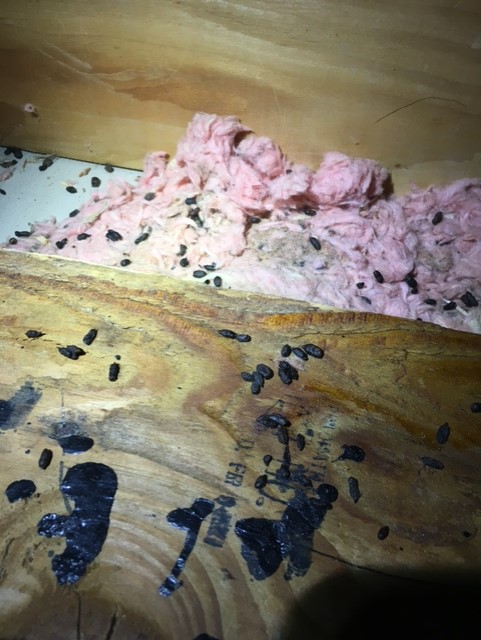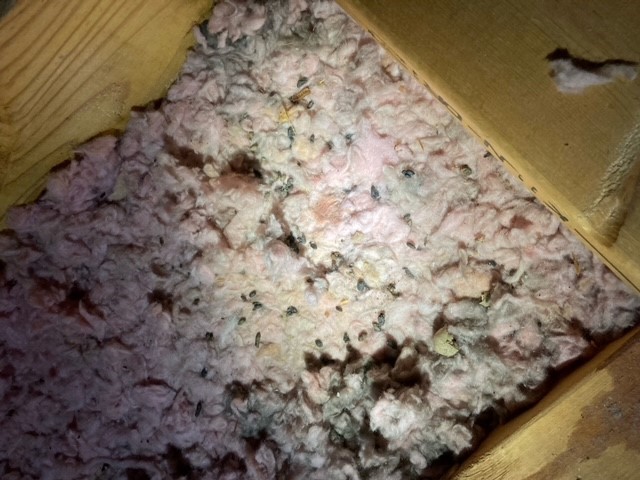Squirrels are one of the most common creatures on Earth. Although there are more than 200 species of squirrels worldwide, only five live in North America: ground squirrels, fox squirrels, flying squirrels, gray squirrels, and red fox squirrels. It wouldn’t be a far leap to say that where there are trees, there are squirrels. And where there are squirrels, there is squirrel poop.
For the most part, people consider squirrels to be adorable and cuddly creatures. We love watching them scamper about, collecting food and chasing one another up and down trees. We can even admire their industrious nature, finding and storing nuts and seeds away for when they’ll need them most. But, squirrels are still rodents and bring many of the same health concerns that rodents such as rats and mice carry.
What Do Squirrel Droppings Look Like?

Squirrel droppings are similar in size to jellybeans or raisins and range from 5 to 8 mm in length. Squirrel droppings look much the same as rat poop or mouse droppings with a few differences. They are similar in size, but squirrel poop is rounder than that of a rat. It has more rounded tips with a slight bulge in the middle. It also is less uniform in shape and size than a rat’s poop.
Because a squirrel’s diet is different than rats or mice, their poop is predominantly brown like rodents but can contain a range of colors such as light brown, reddish, or greenish. In addition, the brown pellets lighten and dry up as they age.
They usually get scattered about as the rodents run and easily blend in with the soil due to their light brown coloration. As tree-dwelling creatures, squirrels often use hollow crevices in tree trunks as toilets. Droppings are generally pill-shaped and cylindrical in appearance, sometimes with tapered ends.
Health Concerns of Squirrel Poop
Squirrels can carry a range of different diseases and parasites, many of which are transmitted through their feces and urine. And unlike some nuisance animals that designate a place to poop, squirrels will defecate as they walk, so it will be all over wherever you have an infestation—not confined to one specific area.
These are a few examples of health concerns associated with squirrel droppings:
- Salmonellosis can be transmitted to humans by inhalation or eating food that has been contaminated with squirrel droppings. It is a bacteria that causes fever, abdominal cramping, vomiting, and diarrhea.
- Leptospirosis is also a bacteria found in squirrel poop and urine spread to humans through contaminated food or water. Symptoms vary from mild flu to severe respiratory issues.
- Roundworm is an internal parasite that can be ingested by humans if food has been contaminated by squirrel droppings. Symptoms include fever, abdominal pain, vomiting, cough, restlessness, and sleep disturbance.
- Sylvatic Typhus is a disease associated with close contact with squirrels that can cause rash, fever, chills, headache, muscle aches, and confusion.
- Tularemia is an infectious disease of the skin, eyes, lymph nodes, and lungs.

How to Clean Up Squirrel Droppings
Squirrel poop that is located on an outdoor deck or patio can be washed away with a hose.
Cleaning up squirrel poop from an attic or other indoor space will not be effective until the squirrels themselves are eradicated. If you’re attempting to clean up squirrel poop on your own, wearing rubber gloves and a face mask is imperative to lessen the spread of disease and parasites. Once the feces are removed, use an antibacterial and disinfecting cleaning product in warm water and scrubbing tools.
The most effective method to clean up squirrel droppings is to call in a wildlife control company that can both eradicate the squirrels and sanitize the area of infestation. This way neither you nor your family and pets will potentially be exposed to unhealthy conditions. If you’re having issues with squirrel droppings, schedule an appointment with one of our expert technicians today for a detailed inspection and action plan to clean your home.
Learn more about squirrel removal.
Get them out.
Keep them out.®
Experiencing a wildlife or pest issue? We can help! Complete this form and your local Critter Control® office will contact you to assist.
- How to Get Rid of Squirrels
- Squirrels Entering Homes
- Squirrels in Attics
- Squirrels in Chimneys
- Squirrels on Roofs & in Soffits
- Squirrels in Walls
- Squirrels in Ventilation
- Squirrels in Gutters
- Squirrels in Crawl Spaces
- Squirrels in Yards or Gardens
- Squirrels in Trees
- Squirrels Digging Holes in the Ground
- How to Identify Squirrel Sounds
- Squirrel Tracks
- Squirrel Trapping
- Squirrel Repellents & Deterrents
- Squirrel Appearance & Identification
- Species & Types of Squirrels
- Squirrel Life Cycle
- Baby Squirrels
- Squirrel Nest
- Dead Squirrels
- Squirrel Diet
- Diseases That Squirrels Carry
- Rabid Squirrels
- Do Squirrels Hibernate?
- Gray Squirrels
- Do Squirrels Bite?
- Squirrel Damage to Your House
- Squirrels vs. Rats
- Squirrels vs. Chipmunks